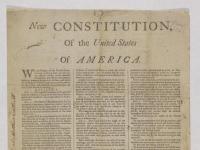On September 17, 1787, the Founding Fathers signed the most influential document in American history in Philadelphia: the United States Constitution. This document established the framework of our government and the rights and freedoms most treasured by us today. As the nation has grown and changed over the last 200 years, so has our “living document,” which now features 27 amendments. The United States has the oldest written constitution in the world. How do we get students excited about this founding document and others? How do get them to analyze and critique the evolution of ideas of freedom and practices of liberty throughout U.S. history?
The Historical Society of Pennsylvania’s Preserving American Freedom digital history project provides 50 key documents for teaching about the evolution of the idea of freedom and practices of liberty in U.S. history. This digital history project features a podcast series for teachers which provides inspiration on how historians themselves teach with primary documents effectively in the classroom around our nation’s founding documents.
Listen to the Preserving American Freedom podcast episodes today to get gain new insights on our founding documents, find inspiration for classroom activities, and gather a deeper understanding on the use primary sources in the classroom.
- Preserving American Freedom and the Common Core Standards: Sally Flaherty, Social Studies Curriculum Advisor for the Pennsylvania Department of Education, talks about how Preserving American Freedom fulfills Pennsylvania and Common Core standards.
- The Contested History of American Freedom: Eric Foner explores the centrality of freedom to America’s identity and its complicated legacy.
- · Liberty, Slavery, and the Civil War: Richard Newman talks about the use that primary sources play in learning about the fight for freedom for African Americans in the 19th century.
- · Citizenship and Freedom in Post-Civil War America: In the late 19th century and early 20th century, Walter Licht explores who is considered a rightful citizen of the United States and what rights and liberties these citizens could or could not exercise.
- · Preserving American Freedom in the Classroom: David Reader wrote the lessons plans for Preserving American Freedom and talks about how he as a teacher uses primary sources in the classroom and how other teachers can utilize Preserving American Freedom in their own classrooms as well.
Learn more about how to teach students about the U.S. Constitution through our digital history project, teacher workshops, and online resources.

